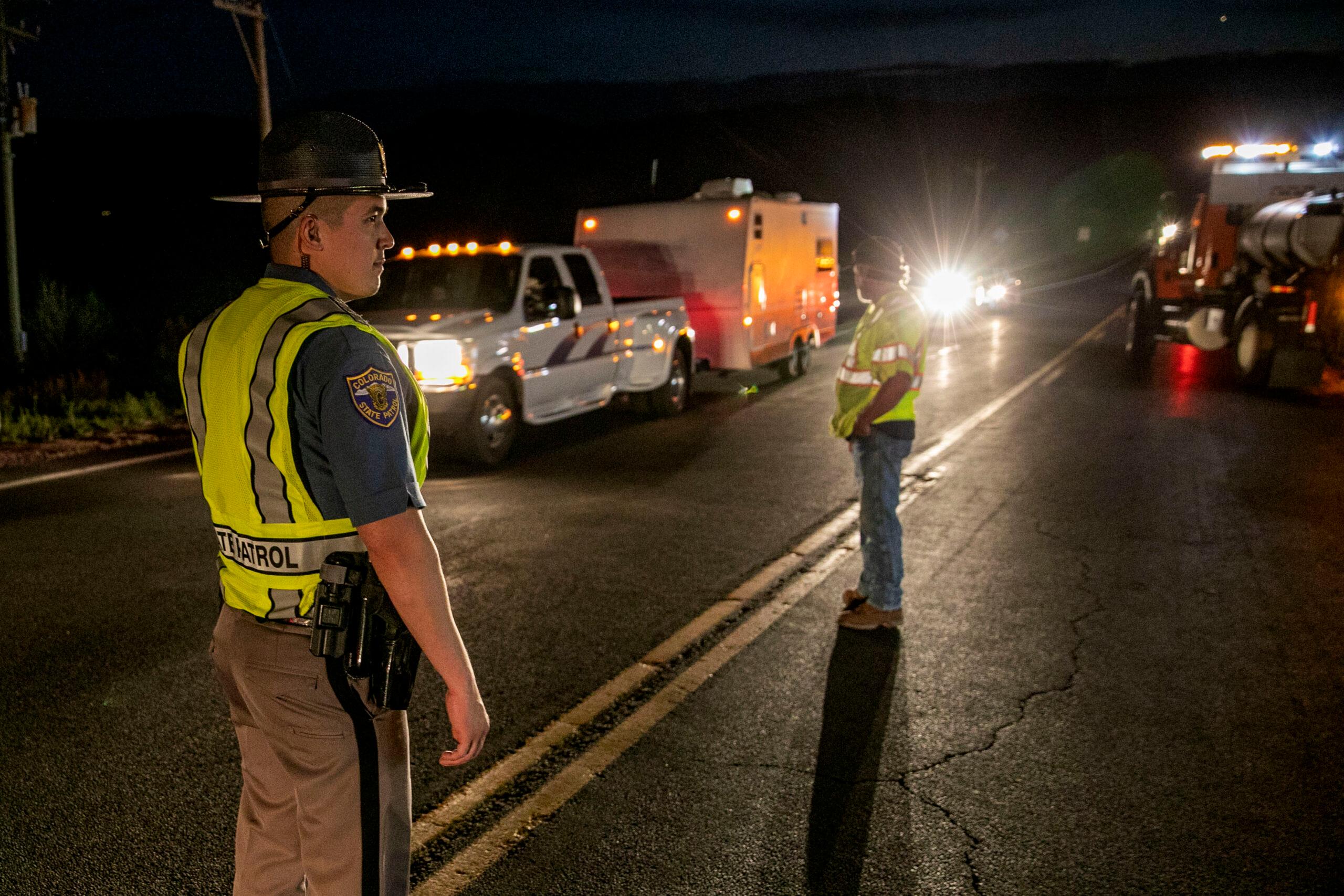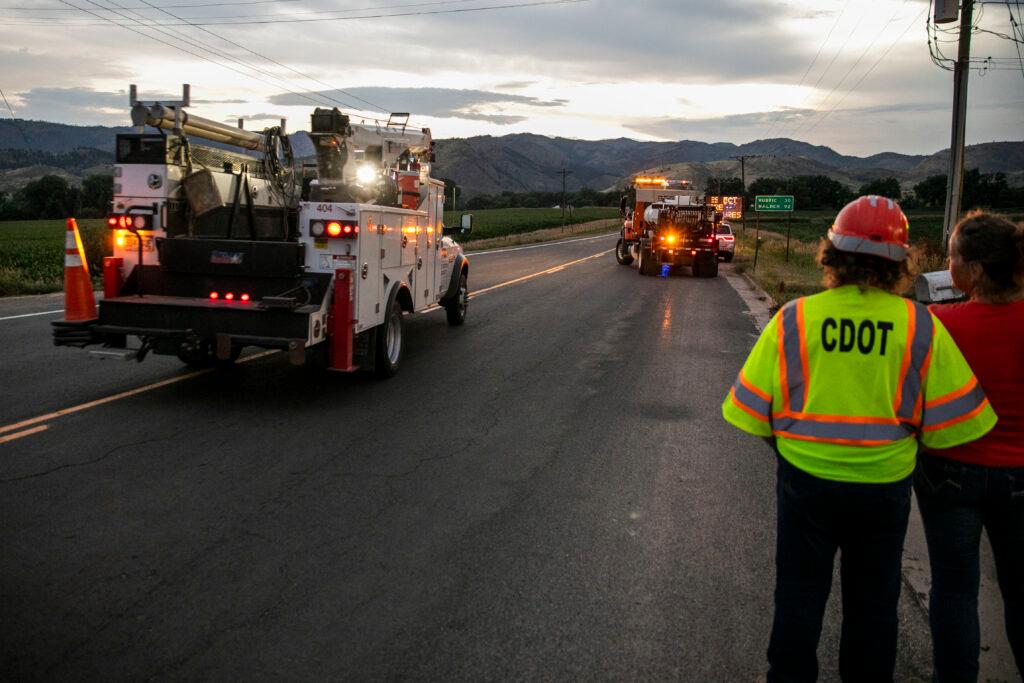
Updated July 21 at 11:50 a.m.
A large swath of Colorado is under a flash flood watch Wednesday as authorities continue to search on foot and with aerial drones for two people who went missing during an overnight flash flood in the upper part of Poudre Canyon.
Get the most recent updates on the flooding in Poudre Canyon here.
Our original story from last night and early this morning follows below.
Updated July 21 at 7:46 a.m.
At least one person died and at least two more were reported missing late Tuesday night as a more than 30-mile stretch of Poudre Canyon, west of Fort Collins, experienced what the Larimer County Sheriff's Office called "dangerous" and "excessive flooding." Flash flood warnings will be in effect for the area through at least 8 p.m. Wednesday, according to the National Weather Service.
The flooding occurred along Highway 14, between Rustic and the intersection with Highway 287 at a gas station near the mouth of the canyon known locally as Ted's Place. The Larimer County Sheriff's Office enforced a mandatory evacuation order for people who live along Highway 14 between Rustic to Ted's Place, but that mandate was lifted as of Wednesday morning.
Jered Kramer, public information officer for the Larimer County Sheriff's Office, confirmed the casualty and missing person reports, and said at least five houses had been destroyed by the flooding. Residents, businesses and campgrounds in Larimer County were evacuated throughout the evening. An evacuation site has been set up by the Red Cross at Cache La Poudre Middle School, 3515 W County Road 54G.
Denver resident Todd Evans was camping near the Cache La Poudre River until a police officer told him to pack up and leave, he told CPR News. "We were able to get some of it. There's still a couple hundred dollars of stuff. Propane bottles, trees, umbrellas, I got some tools that I left up there," he said.
County emergency authorities said just before 10 p.m. that Highway 14 would be closed from Ted's Place west to the Jackson County line through at least Wednesday due to excessive flooding, though they are allowing evacuated residents to return to their homes, subject to a law enforcement checkpoint. They cited danger from debris flowing and said there was "heavy debris" in the area. Forest Service campgrounds along Highway 14 are closed.

The sheriff's office first warned people to seek higher ground just before 7 p.m. As of 7:40 p.m., Poudre Valley REA, an electric co-op providing power to northern Colorado in Larimer, Weld and Boulder counties, said on Twitter, "Early reports indicate there are mudslides in the area resulting in multiple miles of line down." They estimated the outages affected at least 130 customers, but later said that with bridges out and debris not allowing them to cross the river, they couldn't assess all the damage.
On Wednesday morning, the National Weather Service warned of heavy storms and flash flooding further up canyon, over areas burned last year by the East Troublesome and Cameron Peak fires, two of the largest wildfires in Colorado history. A flash flood watch is in place from noon through 8 p.m.
Threats of flooding at the site of a different burn scar, the Grizzly Creek fire, halfway across the state in Glenwood Canyon closed Interstate 70 through Western Colorado on Tuesday evening, as well.
Forest fires are expected to become larger and more unpredictable because of drier and hotter conditions spurred on by climate change, and flash flood risk is higher in wildfire burn scar areas -- particularly in the first two years after the fire.
According to a recent report by the Colorado Division of Fire Prevention and Control, fire seasons are averaging 78 days longer than they were in the 1970’s. In 2020 over 6,500 wildfires burned more than 744,000 acres of land.
Over decades, wildfire activity in Colorado and other western states has worsened due to climate change, which fuels warmer, drier conditions, more drought and a longer fire season, research shows. Climate change — primarily driven by human-caused greenhouse gas emissions — is also likely responsible for an uptick in extreme wildfire behavior.
- Colorado’s East Troublesome Wildfire May Signal A New Era Of Big Fire Blow-ups
- After Years Of Tough Lessons, Spanish-Speaking Communities Rise To Get Wildfire Information Fast And In Their Language
- How These Scrap Wood Startups Could Help Colorado Fight Wildfires
- Foresters Want More Prescribed Burns To Avoid Future Wildfire Disasters In Colorado. But The State Forest Service Isn’t Allowed To Conduct Them
- When The Wilderness Meets The Urban, Homeowners And Neighbors Are On Their Own Against Wildfires
- Stronger Building Codes And Other Rules Can Save Homes From Wildfires. So Why Doesn’t Colorado Have A Statewide Law Mandating Them?
This is a developing story.








